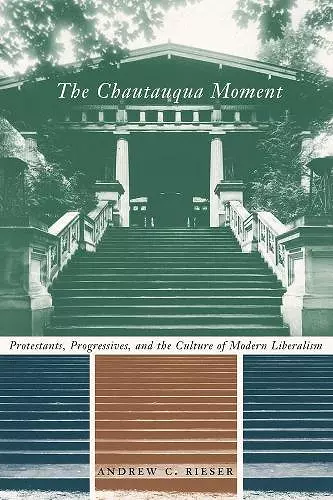The Chautauqua Moment
Protestants, Progressives, and the Culture of Modern Liberalism, 1874-1920
Andrew Chamberlin Rieser author
Format:Hardback
Publisher:Columbia University Press
Published:16th Dec '03
Currently unavailable, and unfortunately no date known when it will be back

More than a college or a summer resort or a religious assembly, the Chautauqua movement was a composite of all of these, and for five decades after it began in 1874, Chautauqua dominated adult education and reached millions with its summer assemblies, reading clubs, and traveling circuits. This critical study weaves the threads of Chautauqua into a single story and places it at the vital center of fin de siecle cultural and political history.
The Chautauqua movement began in 1874 on the shores of Chautauqua Lake in western New York. For five decades, Chautauqua dominated adult education and reached millions with its summer assemblies, reading clubs, and traveling circuits. This book spins a tale of modern liberalism's ambivalent but enduring cultural legacy.This book traces the rise and decline of what Theodore Roosevelt once called the "most American thing in America." The Chautauqua movement began in 1874 on the shores of Chautauqua Lake in western New York. More than a college or a summer resort or a religious assembly, it was a composite of all of these-completely derivative yet brilliantly innovative. For five decades, Chautauqua dominated adult education and reached millions with its summer assemblies, reading clubs, and traveling circuits. Scholars have long struggled to make sense of Chautauqua's pervasive yet disorganized presence in American life. In this critical study, Andrew Rieser weaves the threads of Chautauqua into a single story and places it at the vital center of fin de siecle cultural and political history. Famous for its commitment to democracy, women's rights, and social justice, Chautauqua was nonetheless blind to issues of class and race. How could something that trumpeted democracy be so undemocratic in practice? The answer, Rieser argues, lies in the historical experience of the white, Protestant middle classes, who struggled to reconcile their parochial interests with radically new ideas about social progress and the state. The Chautauqua Moment brings color to a colorless demographic and spins a fascinating tale of modern liberalism's ambivalent but enduring cultural legacy.
Andrew C. Rieser breaks new ground in his sophisticated and exhaustive treatment of Chautauqua. Rieser's breadth of topics is impressive. -- Robert D. Johnson The Journal of American History As the first critical analysis of this influential social movement, this book makes an important contribution to our understanding of the process of creation of white, middle-class identity and the assertion of the hegemony by that class. The Annals of Iowa The Chautauqua Moment is a rich, multi-faceted exploration of one of the... Most influential and elusive movements... Students of state history will learn much from The Chautauqua Moment. -- Thomas N. Baker New York History Destined to be a seminal text not only on the Chautauqua moment but also on... the progressive-era white middle class. -- Amy Kittelstrom Reviews in American History Rieser winsomely and insightfully presents and analyzes the flaws, the merits, and the contradictions... of the Chautauqua movement. -- Paul Hillmer H-Net Reviews
ISBN: 9780231126427
Dimensions: unknown
Weight: unknown
416 pages